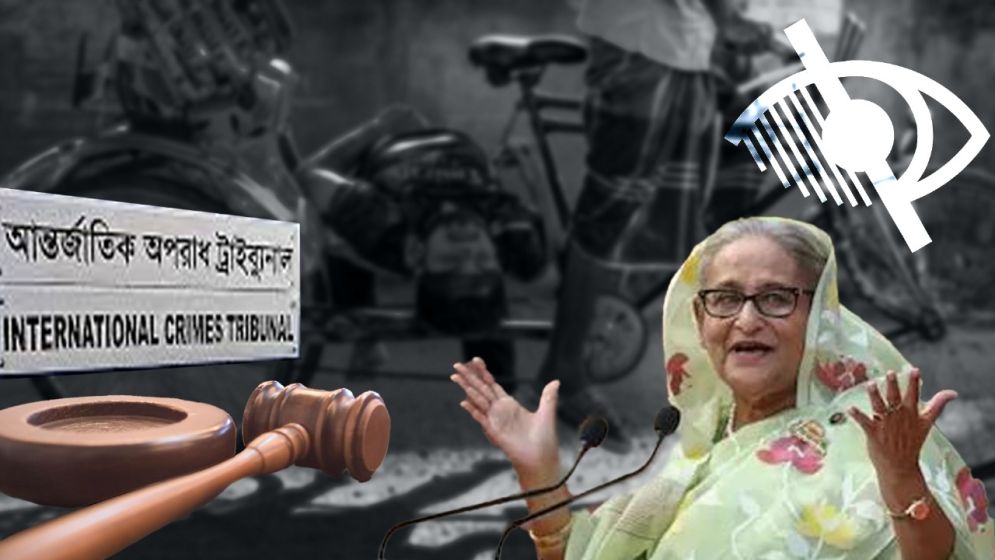The legal blind spot in prosecuting Sheikh Hasina’s party

The trial of Sheikh Hasina for crimes against humanity has begun–a moment long awaited by those who believe justice must not bow to power.
But even as we focus on the outcome of this historic case, a deeper, more structural issue demands attention: Bangladesh’s legal system has no clear doctrine for understanding party-based crimes. It’s a conceptual vacuum hiding in plain sight.
We speak often of politically motivated violence, of “party-backed” attacks, of student wings turned paramilitary. But what does it really mean for a crime to be committed by a political party?
We lack the legal tools–and perhaps even the intellectual will–to define this so far.
Let me be concrete. Suppose I am a member of the Chhatra League. In August, I participated in coordinated street violence–say, an attack involving machetes. Under current law, my personal culpability is easy to establish. The penal code knows what to do with me.
But was I just an individual, or part of a system? Did I act alone, or as an agent of something larger?
The problem emerges when we try to trace command responsibility. If my actions were encouraged–or even silently approved–by higher authorities in the party, at what point does my crime become “party-based”? Did the order come from the student wing’s president? From a senior minister? From the prime minister herself?
Take Obaidul Quader, for instance. If he publicly urges the Chhatra League to “resist” opposition forces on the streets, that rhetoric may fall within the bounds of political speech. But what if, behind closed doors, he instructs the Chhatra League president to physically assault BNP activists?
Is that a personal command? A directive from a minister of the state? Or an order issued in his capacity as General Secretary of the Awami League?

What will be the yardstick
This ambiguity has real consequences for accountability. Hence, we need a jurisprudence that can distinguish between individual criminal responsibility and the kind of orchestrated violence that flows from institutional or party directives.
But the problem is Bangladesh’s legal architecture currently lacks a doctrine akin to “joint criminal enterprise” or “command responsibility” in international law. As a result, prosecutions risk focusing on the foot soldiers while leaving the architects untouched.
But again, how exactly do we determine whether a crime is truly party-based? Can an entire political organization be held responsible for violence or organized criminality committed by its members?
Consider the drug trade in Madaripur. Local operatives affiliated with the BNP, Jamaat, or NCP may run the operation, perhaps even with hierarchical discipline. But if the national leadership remains unaware–or plausibly uninvolved–does that make the crime a product of party policy, or merely one committed by party members?
The distinction is crucial.
When it comes to crimes against humanity, the stakes are even higher. There may be a moral consensus that political parties should bear some collective responsibility. But how do we codify that? What makes a crime organizational rather than individual?
Is it a matter of scale–number of bullets fired, bodies counted? Or does it hinge on command responsibility?
Here's the legal paradox: these atrocities are often executed in ways that appear deeply party-organized. And yet, the directives often flow through non-party channels–through the government, the bureaucracy, the police.
Official party meetings don't record plans for machete attacks. But the capacity for those attacks–the coordination, the impunity–is undeniably tied to the party’s structure and power.
So if we arrive at the question of punishment, what would it mean to hold a political party accountable? Would we treat it as a legal person, like a corporation?
And if so, how do we ethically justify penalizing an entire political entity–its members, supporters, even its voters–for the crimes of a few?

Questions need to be answered
Besides, we need to figure out at what threshold does collective punishment become justifiable? And how do we define command responsibility in a political context where personal, governmental, and party roles blur into one another?
Bangladesh surely lacks any doctrinal clarity on this front. As a result, attempts to prosecute party-based crimes risk falling apart in court–or worse, becoming vehicles for political revenge rather than justice.
This is not an argument for retroactive tribunals. But it is a call for legal foresight. The judiciary must act now to prepare for the future rather than prosecuting the past.
If, God forbid, another party-led massacre unfolds in Bangladesh, will we know how to assign blame? Will we know how to hold the party accountable–not just morally, but legally?
Until we answer these questions, we remain legally unarmed against the very real threat of organized political violence. Justice will remain possible–but never complete.
Just as justice must be served for Sheikh Hasina’s alleged crimes against humanity, so too must we confront the legal void surrounding party-based crimes.
Bangladesh urgently needs a clear, principled framework to define and adjudicate such offenses. A landmark ruling from the courts on this issue is not only overdue–it is essential.
If the Chief Justice were to take the initiative, the nation would be better prepared to uphold accountability, even for the political crises of tomorrow.
—
Faham Abdus Salam is an Australia-based writer and commentator

